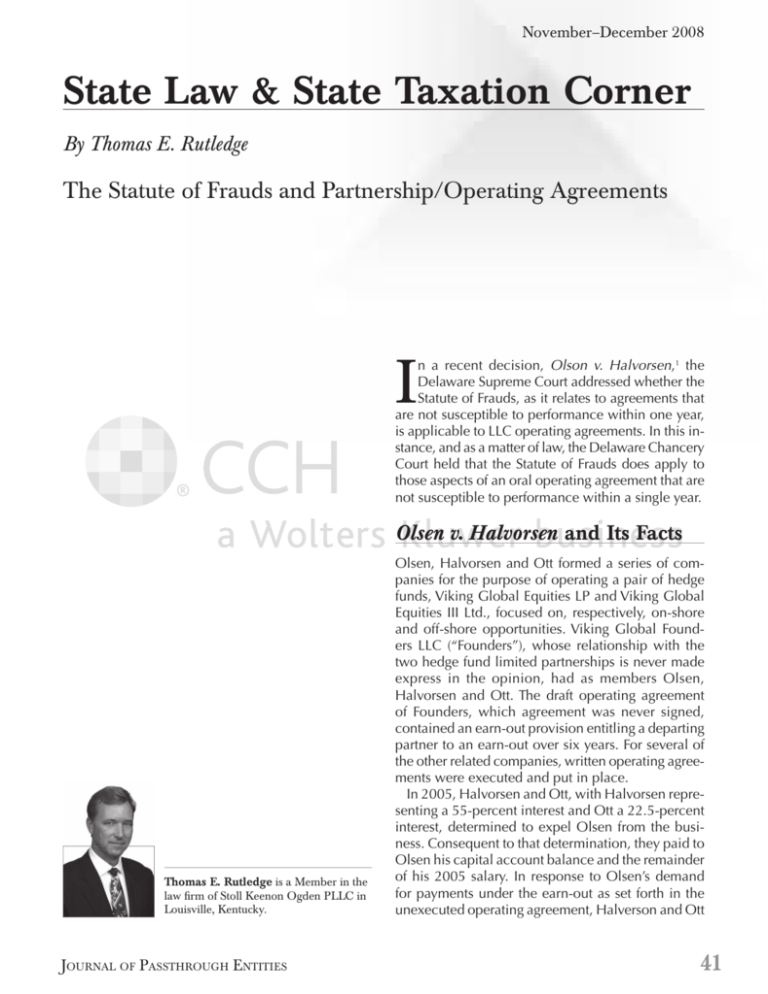
November–December 2008
State Law & State Taxation Corner
By Thomas E. Rutledge
The Statute of Frauds and Partnership/Operating Agreements
I
n a recent decision, Olson v. Halvorsen,1 the
Delaware Supreme Court addressed whether the
Statute of Frauds, as it relates to agreements that
are not susceptible to performance within one year,
is applicable to LLC operating agreements. In this instance, and as a matter of law, the Delaware Chancery
Court held that the Statute of Frauds does apply to
those aspects of an oral operating agreement that are
not susceptible to performance within a single year.
Olsen v. Halvorsen and Its Facts
Thomas E. Rutledge is a Member in the
law firm of Stoll Keenon Ogden PLLC in
Louisville, Kentucky.
JOURNAL OF PASSTHROUGH ENTITIES
©2008
Olsen, Halvorsen and Ott formed a series of companies for the purpose of operating a pair of hedge
funds, Viking Global Equities LP and Viking Global
Equities III Ltd., focused on, respectively, on-shore
and off-shore opportunities. Viking Global Founders LLC (“Founders”), whose relationship with the
two hedge fund limited partnerships is never made
express in the opinion, had as members Olsen,
Halvorsen and Ott. The draft operating agreement
of Founders, which agreement was never signed,
contained an earn-out provision entitling a departing
partner to an earn-out over six years. For several of
the other related companies, written operating agreements were executed and put in place.
In 2005, Halvorsen and Ott, with Halvorsen representing a 55-percent interest and Ott a 22.5-percent
interest, determined to expel Olsen from the business. Consequent to that determination, they paid to
Olsen his capital account balance and the remainder
of his 2005 salary. In response to Olsen’s demand
for payments under the earn-out as set forth in the
unexecuted operating agreement, Halverson and Ott
CCH. All Rights Reserved.
41
State Law & State Taxation
asserted that it did not constitute part of their agreement. In response, Olsen filed suit seeking to collect
on the six annual pay-outs. Considering cross-motions
for summary judgment, the court requested additional
authorities for the position that the Statute of Frauds
would apply to an oral operating agreement, and in
response thereto the court was advised of secondary
sources on the point, but no direct case law.
Ultimately granting the defendant’s motion for
summary judgment as to the assertion that the failure
to make the six-year pay-out constituted a breach
of contract, the Chancery Court (Vice Chancellor
Lamb) held that Statute of Frauds does apply to oral
operating agreements and, further, that the exceptions
argued by the plaintiff were not applicable.
The Delaware LLC Act provides that a limited liability company agreement2 may be “written, oral
or implied.”3 In light of the express authorization of
an oral agreement, the Chancery Court considered
whether the Statute of Frauds should apply to those
agreements. The Delaware Statute of Frauds provides
that an agreement “that is not to be performed within
the space of one year from the making thereof” must
be in writing and signed by the party against whom
enforcement is sought.4 In stating that an operating
agreement may be oral or implied, the Delaware LLC
Act is not express as to whether or not the Statute of
Frauds applies. After observing a conflict between
commentators,5 the Court determined that there was
no broad exemption of operating agreements from
the Statute of Frauds, and that to the extent that a
nonwritten agreement might contain a provision that
cannot possibly be performed within one year, the
agreement to that extent will not be enforceable.6
From there, the Court went on to determine that the
six-year payout sought by Olson was not subject to
performance within a year and that it did not fall
within any of the exceptions, specifically multiple
writings and past performance, that would exempt it
from the Statute of Frauds. Consequently, Olsen did
not receive the six-year pay-out he sought.7
Other Acts
It is quite common for LLC and Partnership Acts
expressly to recognize oral and implied agreements.8 Under the Indiana Business Flexibility Act,
an “operating agreement” is defined as referring to
“any written or oral agreement of the members as to
the affairs of a [LLC] and the conduct of its business
that is binding upon all the members.”9 The Revised
42
©2008
Uniform Limited Liability Company Act (2006) recognizes that an “operating agreement” may be “oral,
in a record, implied, or in any combination thereof.”10 Virginia, in defining an operating agreement,
simply refers to “an agreement of the members,”
without specifying whether the agreement must
be in writing or otherwise.11 Similarly, partnership
agreements may be written, oral or implied,12 as may
limited partnership agreements.13
In contrast, the New York LLC Act defines an operating agreement as a “written agreement” of the
members.14 Further, the New York LLC Act, in §417,
directs that the members “shall adopt a written operating agreement,” but states nothing further with
respect to whether the failure to do so either impacts
upon the validity of the LLC or the enforceability
of an operating agreement that is not in writing. At
least one New York court has held that the default
provisions of the New York LLC Act constitute the
“statutory operating agreement” of the LLC.15
The Revised Uniform Limited Liability Company
Act16 does not impose any Statute of Frauds limitations within its text, while the Prototype LLC Act
did impose writing requirements with respect to
several distinct points, including capital contribution obligations, mandatory records and assignment
of an interest in the LLC.17 Conversely, the Kentucky
LLC Act has distributed throughout the limitation,
inter alia, “except as provided in a written operating
agreement.”18 The best reading of these provisions
is that they are point specific Statute of Frauds that
neither (a) suggest that the general Statute of Frauds
is not applicable to the agreement as a whole nor
(b) in any manner imply that a provision not so initiated is not subject to modification in the operating
agreement. For example, the Kentucky LLC Act, at
KRS 275.290(1), details the basis upon which an LLC
may be judicially dissolved; the provision does not
contain an “except as otherwise provided in a written
operating agreement” provision. Rather than implying that the provision is for that reason not subject
to modification or waiver be private ordering,19 the
correct reading is that there simply exists no Statute
of Frauds limitation, at least with the LLC act, as to
such a modification or waiver.
Other Aspects of the
Statute of Frauds
The Statute of Frauds addresses, of course, obligations other than those to be performed in a single
CCH. All Rights Reserved.
November–December 2008
year. For example, it is common and indeed may be
universal that agreement relating to the sale or transfer
of real property must be in writing.20 An obligation
to contribute real property to a partnership or LLC is
clearly subject to the Statute of Frauds.21 Conversely,
the fact that the sole or the primary asset of an LLC
is real property does not of itself subject the operating agreement to the requirements of the Statute of
Frauds.22 Further, it has long been recognized that
an oral partnership agreement addressing the profits
from or dealing in real property for profit is not invalid
on the grounds of the Statute of Frauds.23
The Partnership Cases
With respect to general partnerships, the application
of the Statute of Frauds may depend on the nature of
the partnership. Partnerships may exist “at will,” “for
particular undertaking” or “for a particular term.”24
With respect to a partnership at will, that being one
which is terminable by any partner without, absent
contrary private ordering, any liability consequent to
that termination, the agreement to establish the partnership is terminable within one year of its making and
is therefore outside the Statute of Frauds.25 Conversely,
where a partnership is for a term to exceed a year, or
where the undertaking will require more than a year
from the time of the making of the contract, and there
is agreement to remain partners for that period of
time, the agreement should be subject to the dictates
of the Statute of Frauds.26 Unfortunately, it must be
recognized that not all courts have recognized these
distinctions, and have as a consequence issued overly
broad and consequently incorrect statements as to the
application (or not) of the Statue of Frauds.27
The Application of the Statute
of Frauds to Oral Partnership/
Operating Agreements
At a recent meeting of the Committee on LLCs,
Partnerships and Unincorporated Entities, there was
a split among the participants regarding the impact
of the Olsen ruling. There was expressed the view
that the decision is detrimental to the enforcement
of agreements and that the statutory authorization
of oral and implied agreements should have been
interpreted as overriding the Statute of Frauds. Other
participants took the opposite view, noting that there
was no express override of the Statute of Frauds,
JOURNAL OF PASSTHROUGH ENTITIES
that the Delaware legislature is well aware of how
to expressly override otherwise applicable statutory
provisions,28 and that partnership/operating agreements are not of such a nature that the accepted
benefits of the Statute of Frauds should not there apply. I am of the second opinion. The Statute of Frauds
applies not to agreements generally, but only (at least
as applied in Delaware) to individual provisions of
agreements that have not been reduced to a signed
writing. Olsen has no application to signed agreements, but the knowledge of its holding should further
incentivize both counsel and members to see that the
partnership/operating agreements that are prepared
are properly executed. Terms that do not implicate
one of the categories of agreements subject to the
Statute of Frauds, including terms that are subject to
performance within a year, will remain enforceable.
Only a narrow class of possible terms will be set
aside by the Statute of Frauds, and the fact that it has
taken until 2008, Delaware having adopted its LLC
Act in 1992, for such a case to arise evidences that
the issue is quite narrow.
That said, there is at least one point on which
clarification would be helpful. Under Delaware law,
as well as the law of numerous other jurisdictions, a
merger or other organic transaction may be approved
by less than a majority of the partners/members,29 but
even those not voting in favor of the transaction are
deemed bound by the partnership/operating agreement of the organization surviving the transaction.30
There is a question as to whether the nonconsenting partners/members are going to be able to assert
a Statute of Frauds defense against any provisions
of those agreements that fall within the Statute of
Frauds. While there will in most if not all instances
be no question as to the terms of the agreement, the,
or at least a, question will be whether the statutory
declaration that the partners/members are bound
is sufficient to override any provisions thereof that
would otherwise implicate the Statute of Frauds.
Conclusion
Partnerships, both limited and general, and LLCs exist not as islands of law unto themselves but rather
within a sea of other law.31 Being primarily creatures
of private ordering between the participants, we are
accustomed to looking first to that agreement in order
to ascertain the rights and responsibilities of the various parties.32 The Olsen decision provides important
guidance as to how broader contract law applies in
43
State Law & State Taxation
the relatively new realm of operating agreements,
and cautions each of us who have relied upon an
express statutory authorization/recognition of oral
operating agreements not to consider such to be ipso
facto exempt from broader contract law including the
Statute of Frauds.
ENDNOTES
1
2
3
4
5
6
7
44
Olson v. Halvorsen, Del. Ch., 2008 Del. Ch.
LEXIS 156 (Oct. 22, 2008).
While “limited liability company agreement” is the defined term in the Delaware
LLC Act (DEL. CODE ANN. tit. 6, §18-101(7)),
throughout the opinion these documents are
referred to as “operating agreements.”
DEL. CODE ANN. tit. 6, §18-101(7) provides in
full: “‘Limited liability company agreement’
means any agreement (whether referred to
as a limited liability company agreement,
operating agreement or otherwise), written,
oral or implied, of the member or members
as to the affairs of a limited liability company
and the conduct of its business.”
D EL . C ODE . A NN . tit. 6, §2714(a). Other
states have similar rules. For example, the
Kentucky Statute of Frauds provides in part
that “No action shall be brought to charge
any person: … (7) Upon any agreement
that is not to be performed within one year
from the making thereof.” KY. REV. STAT.
ANN. §371.010.
The court recited the observation of Professors Bishop and Kleinberger to the effect
that while the definition of an operating
agreement may encompass oral agreements, nothing therein would suggest an
attempt to override the Statute of Frauds
(CARTER G. BISHOP & DANIEL S. KLEINBERGER,
LIMITED LIABILITY COMPANIES: TAX AND BUSINESS
L AW §14.03 (2008), and Symonds and
O’Toole for the proposition that statutory
recognition of oral operating agreements,
when combined with the stated policy to
give maximum effect to the enforceability
of operating agreements (DEL. CODE ANN.
tit. 6, §18-1101(b)), creates an inference
that the Statute of Frauds should be overridden. ROBERT L. SYMONDS, JR. & MATTHEW J.
O’TOOLE, SYMONDS & O’TOOLE ON DELAWARE
LIMITED LIABILITY COMPANIES §4.02 (2007).
It should be recognized that this provisionby-provision application of the Statute of
Frauds is at odds with the rule as sometimes
applied that if any aspect of the agreement
falls within but does not satisfy the Statute
of Frauds, the entire agreement is unenforceable. See, e.g., E. ALLAN FARNSWORTH,
CONTRACTS §6.4 (2nd Ed. Little Brown 1990).
In Sheehy v. Clifford Chance Rogers & Wells
LLP, NY CtApp, 3 NY3d 554, 822 NE2d 763,
789 NYS2d 456 (2004) the court held that a
claimed agreement to pay certain retirement
benefits to a departing partner notwithstanding the fact that, under the partnership agreement as written he did not qualify for same,
was subject to the Statute of Frauds and for
that reason not enforceable.
8
9
10
11
12
13
14
15
16
17
18
19
20
21
See, e.g., KY. REV. STAT. ANN. §275.015(20)
(“‘Operating agreement’ means an agreement, written or oral, among all of the
members, as to the conduct of the business
and affairs of a [LLC].”)
IND. CODE §23-18-1-16.
ULLCA §102(13), 6B U.L.A. 429 (2008).
VA. CODE ANN. §13.1-1002. See also SOUTH
CAROLINA CODE §33-44-101(13) (defining
operating agreement as an agreement but
not specifying whether or not such may need
be in writing, exist orally or be implied). See
also 1 LARRY E. RIBSTEIN AND ROBERT R. KEATINGE,
RIBSTEIN AND KEATINGE ON LIMITED LIABILITY COMPANIES, appendix 4-19 (Thomson/West 2007).
See, e.g., Revised Uniform Partnership Act
§101(7), 6 U.L.A. 61; KY. REV. STAT. ANN.
§362.1-101(11).
See, e.g., Uniform Limited Partnership Act
(2001) §102(13), 6A U.L.A. 359 (2008); KY.
REV. STAT. ANN. §362.2-102(17).
New York LLC Law §102(u).
See In re Spires, N.Y. SCt., 4 Misc. 3d 428;
778 NYS2d 259; 2004 N.Y. Misc. LEXIS
628 (2004)
6B U.L.A. 407 (2008) (hereinafter “RULLCA”).
See Prototype LLC Act §405 (mandatory
records), §502 (capital contributions) and
§704 (assignment).
See, e.g., KY. REV. STAT. ANN. §275.150(2)
(waiver of limited liability as to all or certain
debts of the LLC), §275.220 (member not
entitled to a distribution other than in cash),
and §275.265 (admission of an assignee as
a member).
See R&R Capital, LLC v. Buck & Doe Run
Valley Farms, LLC, Del. Ch., 2008 Del. Ch.
LEXIS 115 (Aug. 19, 2008)).
See, e.g., KY. REV. STAT. ANN. §371.010 (“No
action shall be brought to charge any person:
… (6) Upon any contract for the sale of real
estate ….”)
See, e.g., Deshazo v. Estate of Clayton, DC
Id., 2006 U.S. Dist. LEXIS 44612 (2006)
(oral promise by a member to contribute
real property to LLC unenforceable under
Statute of Frauds); Quimby v. Myers, SCt,
179 Vt. 611, 895 A2d 128 (2005) (“It is well
settled that a writing is required to transfer
real property, already owned by one partner,
to another partner or to the partnership,”
citing in support thereof Johnson v. Gilbert,
Az. CtApp, 127 Ariz. 410, 621 P.2d 916
(1980) (contract providing for “transfer of
land from one partner or joint venturer to
another is within the Statute of Frauds”);
McCloud v. Davison, Fla. CtApp, 719 So2d
995 (1998) (agreements between partners
©2008
CCH. All Rights Reserved.
22
23
24
25
or joint venturers to buy or sell land are not
within the purview of the Statute of Frauds
“unless there is a provision for transfer of
title to specific real property from one of the
parties to another”); Amendola v. Kendzia,
N.Y. SCt, 17 AD3d 1105, 793 NYS2d 811
(2005) (affirming motion to dismiss partner’s
claim for accounting of alleged partnership
asset in real property on ground that oral
agreement to convey property to partnership
was barred by Statute of Frauds); Ludwig v.
Walter, N.C. CtApp, 75 NC App. 584; 331
SE2d 177 (1985) (“[T]he general rule is
that land owned individually by one who
enters into a partnership cannot become
a partnership asset absent some written
agreement sufficient to satisfy the Statute
of Frauds.”); Gunsorek v. Heartland Bank,
Ohio CtApp, 124 Ohio App. 3d 735, 707
NE2d 557, 563-64 (1997) (trial court erred
in failing to grant summary judgment based
on absence of writing under general rule that
partner’s agreement to transfer real property
he already owned as his contribution to the
partnership is within Statute of Frauds); Shire
Dev. v. Frontier Invs., Utah CtApp, 799 P2d
221, 223-24 (1990) (if agreement provides
for transfer of real property interests among
partners, “it would have to be in writing in
order to comply with the Statute of Frauds”);
see generally 1 Z. CAVITCH, BUSINESS ORGANIZATIONS §14.03[2], at 14-15 (2005) (observing
that Statute of Frauds applies “where real
property [is] to be conveyed from one partner to another”); 9 R. LORD, WILLISTON ON
CONTRACTS, §25.17, at 606 (4th ed. 1999)
(noting general rule that agreement that new
partnership shall have an interest in realty
owned by one of the partners is within the
Statute of Frauds).
See, e.g., Fausak’s Tire Center, Inc., v.
Blanchard, Ala. Civ.App., 959 So2d 1132
(2006) (an oral buy-sell agreement as to an
interest in an LLC was not unenforceable by
reason of the Statute of Frauds even though
the LLC’s sole asset was real property; the
interest subject to the buy-sell agreement
was personal property).
See, e.g., I WILLIAM F. ELLIOTT, COMMENTARIES
ON THE LAW OF CONTRACTS at §488, p. 725
(Bobbs-Merrill 1913).
See Revised Uniform Partnership Act
§101(8), 6 U.L.A. 61 (defining a “partnership
at will”); KY. REV. STAT. ANN. §362.1-101(12)
(id.); Official Comment to RUPA §101.
See, e.g., Abbott v. Hurst, Ala. SCt, 643 So2d
589 (1994). As to the rule that no damages
arise on the dissolution of a partnership at
will, see generally 59A AM.JUR.2d Partner-
November–December 2008
ENDNOTES
26
27
28
ship §565.
See, e.g., CALLISON & SULLIVAN, PARTNERSHIP
LAW AND PRACTICE §5:32 (“An agreement
to form a partnership for more than one
year is within the Statute of Frauds, and
when there is no written agreement, the
partnership arrangement can be dissolved
without breach of contract at any time
prior to part performance of the contract.”). See generally 1 ALAN R. BROMBERG
AND L ARRY E. R IBSTEIN , B OMBERG AND R IBSTEIN
ON P ARTNERSHIP §2.13(c).
See, e.g., Estate of Delbert Bessinger v.
Kirkwood, Nos. 1997-CA-000534-MR and
1997-CA-000610-MR (Ky. App. December
30, 1998) (“It is clear that partnership
agreements do not fall within the Statute
of Frauds, KRS 371.010.”), citing Frankfort
& Cincinnati Railway Co. v. Jackson, Ky.
CtApp, 153 Ky. 534, 156 SW 103 (1913),
Goodwin v. Smith, Ky. CtApp, 144 Ky. 41,
137 S.W. 789 (1911).
An example given was the override of UCC
§9-406 and §9-408 that appears at DEL.
29
30
31
CODE ANN. tit. 6, §§18-1101(e), 15-104(c)
and 17-1101(e).
DEL CODE ANN. tit. 6, §18-209(b) (approval
of LLC merger by 50 percent of voting units)
See also KY. REV. STAT. ANN. §275.350(1)
(approval of merger by majority-in-interest
of the members); Utah Code Ann. §§482c-1408(1)(a), 48-2c-803(3)(ii)(f) (approval
of merger by members holding two-thirds
of profits interests); and TENN CODE ANN.
§48-249-702(c)(B)(approval of merger by
majority of the members).
DEL CODE ANN. tit. 6, §18-209(f)(1)-(2) (providing for amendment or adoption of operating agreement of LLC surviving merger). See
also KY. REV. STAT. ANN. §275.360(4) (a plan
of merger may provide for the amendment
or creation of an operating agreement to “be
effective at the effective time or date of the
merger.”); TENN. CODE ANN. §48-249-702(i)
(amendment of existing or adoption of new
operating agreement by merger)
See, e.g., Uniform Partnership Act §4, 6
U.L.A. 386 (2001); RUPA §104(a), 6 U.P.A.
32
78 (2001); RULLCA §107, 6B U.L.A. 440
(2008); KY. REV. STAT. ANN. §275.003 (“Unless displaced by particular provisions of
this chapter, the principles of law and equity
shall supplement this chapter.”)
See, e.g., Fisk Ventures, LLC v. Segal, Del.
Ch., 2008 Del. Ch. LEXIS 158 (May 7, 2008)
(the operating agreement “defines the scope,
structure, and personality of limited liability
companies”); TravelCenters of A.M., LLC
v. Brog, 2008 WL 1746987 at *1 (Del. Ch.
April 3, 2008) (“Limited Liability Companies are creatures of contract, ‘designed to
afford the maximum amount of freedom of
contract, private ordering and flexibility to
the parties involved.’”) (quoting in part In
re Grupo Dos Chiles, LLC, Del. Ch., 2006
Del. Ch. LEXIS 54 (Mar. 10, 2006); Walker
v. Resource Development Company Limited,
LLC, Del. Ch., 791 A2d 799 (2000) (“LLC
members’ rights begin with and typically
end with the Operating Agreement.”); DEL.
CODE ANN. tit. 6, §18-1101(b); KY. REV. STAT.
ANN. §275.003.
This article is reprinted with the publisher’s permission from the JOURNAL OF PASSTHROUGH ENTITIES,
a bi-monthly journal published by CCH, a Wolters Kluwer business. Copying or distribution
without the publisher’s permission is prohibited. To subscribe to the JOURNAL OF PASSTHROUGH
ENTITIES or other CCH Journals please call 800-449-8114 or visit www.CCHGroup.com.
All views expressed in the articles and columns are those of the author and
not necessarily those of CCH or any other person. All Rights Reserved.
JOURNAL OF PASSTHROUGH ENTITIES
45

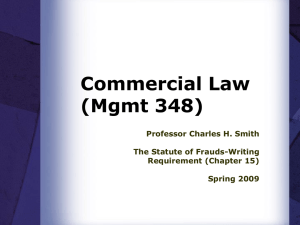
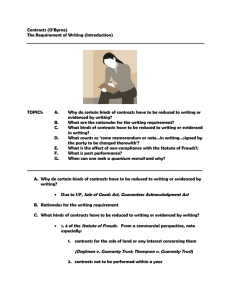
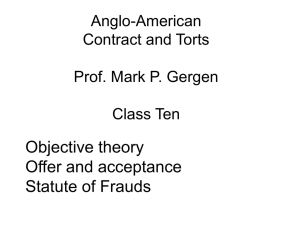
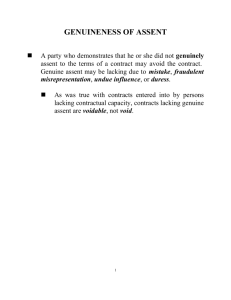

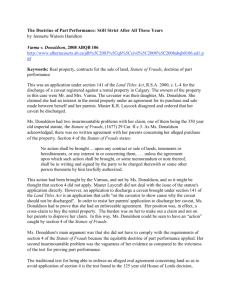
![Your_Solutions_LLC_-_New_Business3[1]](http://s2.studylib.net/store/data/005544494_1-444a738d95c4d66d28ef7ef4e25c86f0-300x300.png)